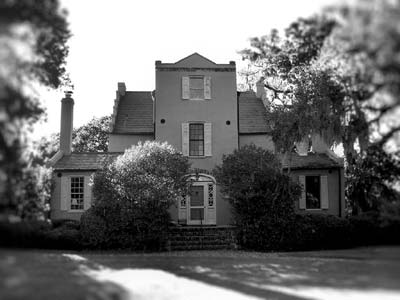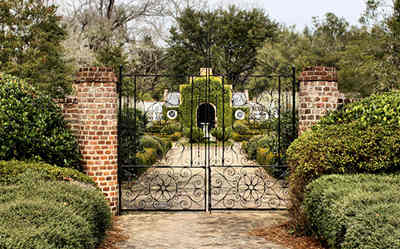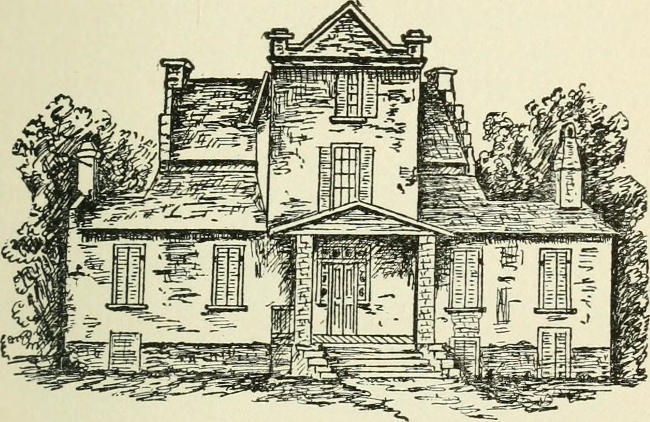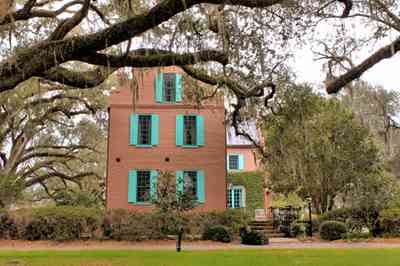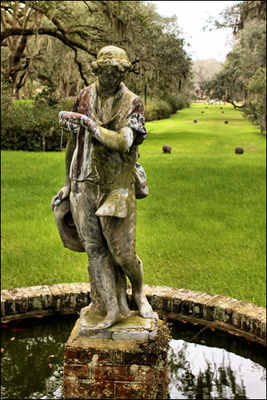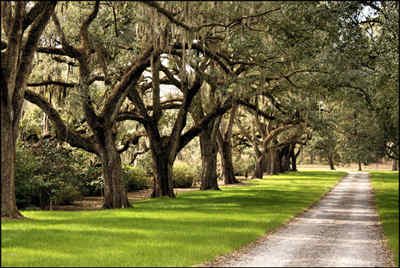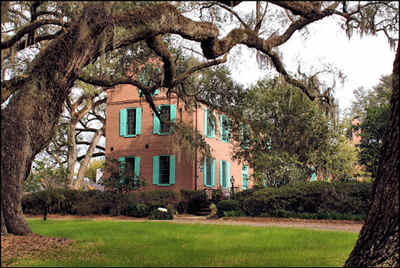Medway Plantation – Goose Creek – Berkeley County
Basic Information
- Location – Back River (a branch of the Cooper River), Goose Creek, St. James Goose Creek Parish, Berkeley County
Located three miles east of US 52 on Medway Road
- Origin of name – Wanda W. Smith shares, "It has always been my understanding that the plantation was named "Medway" after the Medway River that flows near Exeter, England, the home of Thomas Smith, the first Landgrave [a Landgrave was the head of a territory] (15)."
While other sources note the plantation received its name for its location along the Medway River which is now called the Back River (11, p. 62).
- Other names – Jan Van Arrsen's House
- Current status – Privately owned, not open to the public; home to many bird colonies and protected with conservations easements prohibiting commercial development
Timeline
- 1686 – Earliest known date of existence
John D'Arrsens [some sources note his name as Jan Van Arrsen, Seigneur De Weirnhoudt], from Holland, was granted 12,000 acres of land and all the rights of Barony by the Lords Proprietors. This property would be known as Whiskinboo Barony. D'Arrsens had 2,100 acres laid out to be developed into his manor, Medway (3, p. 2).
- 1686 – Brick house built by John D'Arrsens (3, p. 2) (11, p. 45)
- 1689 – John D'Arrsens died a short time after acquiring the grant and his widow married Thomas Smith. D'Arrsens' land holdings were granted by the Lords Proprietors to Thomas Smith, Landgrave (a Landgrave was the head of a territory) (1) (7, XII: 25) (11, p. 45).
- 1694 – Landgrave Thomas Smith died and is buried at Medway Plantation. Smith left all his property to his son, the second Landgrave Thomas Smith (7, XII: 25) (11, pp. 45-46).
- ? – Elizabeth and Edward Hyrne acquired the property.
- 1704 – The house burned (5, p. 18).
- 1705 – New house built by Elizabeth and Edward Hyrne (5, p. 18).
- ? – The Hyrnes encountered legal and financial woes. These including never obtaining a clear title to the Medway property. As a result, Medway was returned to Thomas Smith II (5, p. 19).
- ? – Thomas Drayton owned the plantation and sold it to John Bee Holmes (1).
- 1797 – Holmes did not pay his taxes and Medway was sold by the sheriff to Theodore Samuel Marion (8, p. 68).
- 1827 – Theodore Samuel Marion died willing his estate to Theodore Samuel Dubose, his grandson (1).
Marion added a second story to the house and his wife, Jane Porcher, is credited for planting the large trees around the house (1).
- ? – "Carolina Grey" brick was produced at Medway and was used in the building of Fort Sumter (11, p. 64).
- 1833 – Peter Gaillard Stoney purchased Medway (1).
- 1855 – Stoney added a wing to the house (1).
- 1906 – Samuel Gaillard Stoney bought the plantation from the estate of his uncle, Peter Gaillard Stoney (8, p. 69).
- 1929 – Medway was sold to Sidney and Gertrude Legendre for $100,000. They added extensively to the outbuildings and improved the interior of the house (1) (13).
- Medway Plantation has been declared an Important Bird Area by Audubon for the Red-cockaded Woodpeckers, Bald Eagles, Wood Ducks, and wintering Ring-necked Ducks that make the plantation their home.
- 2000 – Bokara Legendre inherited the plantation from her mother (13).
- 2012 – Tradeland Investors Inc., owned by Gregory Callimanopulos and his family, purchased the plantation for $11 million dollars. The plantation had originally been placed for sale in 2004 for $25 million (13).
Land
- Number of acres – 2,100 in 1689; 6,695 in 2012
- Primary crops – Brick and rice early on. Much of the brick used in the construction of Fort Sumter came from Medway. Rice production ended in 1865 and then Medway became a cotton plantation (11, p. 64).
- The plantation boasts two avenue of oaks (14)
- An old race track can still be traced on the grounds from when Peter Stoney raised thoroughbred horses (1).
- The cemetery is very close to the old house, which is now shaded by giant oaks and climbing ivy. The graves of Thomas Smith, Sabina Smith, Sidney Hennings Legendre, Reverend Elias Prioleau, and Samuel Prioleau are located there (1).
- Many ghosts are said to walk inside the low-ceiling rooms with the large fireplaces and narrow windows. At one of the windows, it is said, one can see the shadowy image of a lady who sits and waits for the return of her husband. Some have claimed to have seen an old gentleman seated in front of the fireplace smoking his pipe.
- The plantation contains a formal garden laid out in the early 1900s.
Owners
- Alphabetical list – Ball; Chapman; John D'Arrsens (1686); DeVignon; DeWeivnhoudt; Thomas Drayton; Theodore Samuel Dubose (1827-?); Durant; Frank; Fripp; James Hasell; John Bee Holmes (?-1797); Elizabeth and Edward Hyrne (1705); Bokara Legendre (2000-2012); Sidney and Gertrude Legendre (1929-2000); Aaron Loocock; Theodore Samuel Marion (1797-1827); Philbrick; Prioleau; Abraham Satur; Thomas Smith; Thomas Smith II; Spears; Stevens; Peter Gaillard Stoney (1833-?); Samuel Gaillard Stoney (1906-?); Tradeland Investors Inc. (2012-present); Sabina de Vignonm (1686); James Wathen; John Wright
Slaves
- Number of slaves – ?
We are actively seeking information on the slaves who lived and worked at this plantation. If you find a resource that might help, please fill out this form. Thank you.
Buildings
- The house remains and is reported to be the oldest masonry house in South Carolina. A second floor addition and wings were later added (3, p. 2).
- The plantation contains a number of 19th century auxiliary buildings, including a plantation school and servants' houses.
- Brandon Coffey shares that lore suggests the reason the roof line was designed with a stair-step gables to allow evil spirits to be able walk away from the house easily and leave it in peace (14).
References & Resources
- Brief history of Medway Plantation from the South Carolina TriCounty Genealogy Site: Click here
- Audubon Site Profile - source no longer available online
- National Register of Historic Places
– Nomination form - PDF - submitted in 1970
– Photographs, architectural overview
- 30-15 Plantation File, held by the South Carolina Historical Society
- William P. Baldwin Jr., Plantations of the Low Country
(Westbrook, ME: Legacy Publishing, 1994)
- Virginia Christian Beach, Medway
(Charleston, SC: Wyrick and Company, 1998)
- Claude Henry Neuffer, editor, Names in South Carolina, Volume I through 30 (Columbia, SC: The State Printing Company)
 Order Names in South Carolina, Volumes I-XII, 1954-1965
Order Names in South Carolina, Volumes I-XII, 1954-1965
 Order Names in South Carolina, Index XIII-XVIII
Order Names in South Carolina, Index XIII-XVIII
- John Beaufain Irving, A Day on Cooper River (1842)
(Whitefish, MT: Kessinger Publishing, LLC, 2010)
- SC Highway Historical Marker Guide - online database by the SC Department of Archives & History
- Catherine Campart Messmer, South Carolina's Low Country - A Past Preserved Text (Orangeburg, SC: Sandlapper Publishing, 1988)
- J. Russell Cross, Historic Ramblin's through Berkeley
(Columbia, SC: R.L. Bryan Company, 1985)
 Order Historic Ramblin's through Berkeley
Order Historic Ramblin's through Berkeley - News & Courier Newspaper (predecessor to the Charleston Post & Courier) February 26, 1933 issue reprint of Free South April 4, 1863 listing of St. Helena Island plantation sales prior to the Civil War
- Historic Medway Plantation in South Carolina Sells for US$11 Million, (April 12, 2012)
- Information contributed by Brandon Coffey.
- Information contributed by Wanda Smith.

